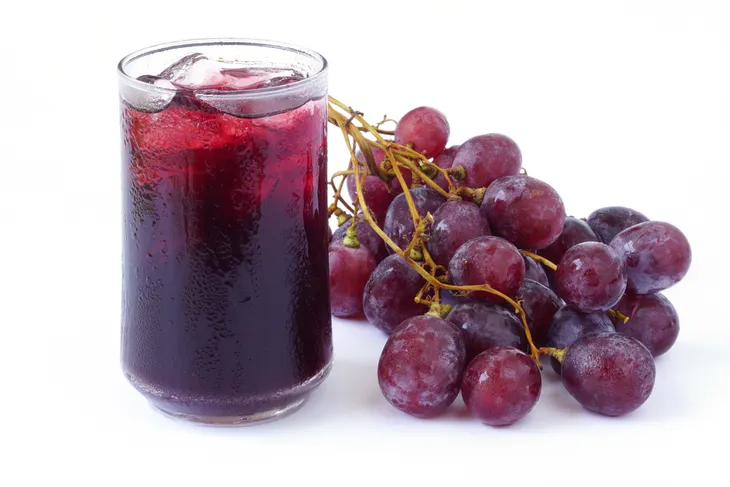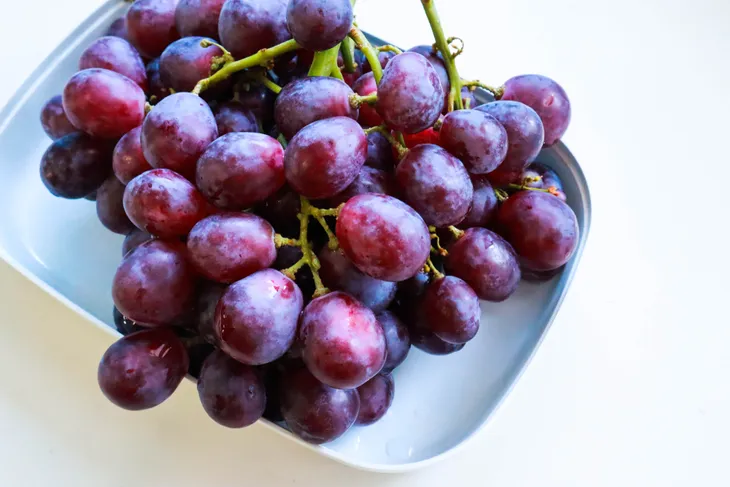Grown on vines and in bunches, grapes are now sold in many different forms. They can be bought with seeds or without, in the color red, green, or dark purple, or even in the form of juice or jam! Same as any other fruit, the best way to enjoy grapes is in their natural state because this is how you’ll reap the most of their health benefits.
Grapes have been around for millions of years and enjoyed by people for centuries, especially because they are nutritional powerhouses. Even though this fruit is small, trust us when we say, it packs a mean punch when it comes to nutrition.
Grapes are loaded with antioxidants that make them useful in protecting and maintaining a strong immune system, bones, kidney and heart function, as well as supporting a sharp mind and eyesight. Want to know more? Here’s a look at all the incredible health benefits of grapes…
Want diet & nutrition content delivered straight to your inbox? Sign up for our exclusive diet & nutrition newsletter!
They Can Improve Eye Health
Many of grapes benefits come from the fact that they contain antioxidants. When it comes to eye health, this is no different! Grapes contain lutein and zeaxanthin which help protect the eyes from the damage of blue light. They also contain resveratrol which studies show could protect against glaucoma, cataracts and diabetic eye disease.
To back this claim up there was a study published in the Journal of Nutrition examined mice who were fed a diet supplemented with grapes and those who weren’t. The results showed that the mice who ate grapes had “fewer signs of damage to the retina and had better retinal function compared with mice who were not fed the fruit.” Another test-tube study found that resveratrol could “protect retinal cells in the human eye from ultraviolet A light,” writes Healthline. This could mean that eating grapes might help lower a person’s risk of developing age-related macular degeneration.
Lower Blood Pressure
There are many reasons we should be eating grapes, one of the big ones is that they’re great for our heart health. The reason they’re so good for our heart is because they are able to lower blood pressure. Healthline points out that grapes are high in potassium which helps maintain blood pressure. Many people who suffer from high blood pressure or are at risk for heart disease and stroke, also have low potassium. To reap these benefits from grapes all it takes is a small amount. For example, 1-cup of grapes contains 288-mg of potassium which adds up to 6-percent of our recommended daily amount.
Healthline cites a study which examined 12,267 participants and found that those who “consumed higher levels of potassium in relation to sodium were less likely to die from heart diseases than those who consumed less potassium.”
When shopping for grapes, consider buying concord grapes or red grapes because they might reap the most hearty health benefits due to their rich color. “Concord grapes contain many flavonoids, including resveratrol, which can help decrease blood pressure by improving the fluidity of the blood. Resveratrol also relaxes the arterial walls to allow adequate circulation and decrease the pressure in the arteries,” writes Chatelaine.
Reduce Cholesterol
The healthy compounds in grapes give them the ability to “protect against high cholesterol levels by decreasing cholesterol absorption,” writes Healthline. The source cites a study which examined 69 people with high cholesterol. The participants ate 3-cups of red grapes each day for 8-weeks and in the end were shown to have lowered their LDL “bad” cholesterol. It’s important to note that white grapes did not have the same effect, so be sure to choose red grapes when looking for this particular health benefit.
May Protect Against Cancer
Grapes are able to protect us against cancer because they’re rich with antioxidants and nutrients that prevent inflammation and in return, reduce oxidative stress and chronic inflammation. Another thing that makes grapes so great is their fiber content. Fiber is necessary for a healthy digestive system, particularly when it comes to the colon.
“This antioxidant-fiber combination may be one of the reasons that colon cancer prevention has become more prevalent in health research on grapes,” writes Dr. Axe. The source refers to a study performed by the Department of Health Sciences at the University of Milan and the San Paolo Hospital in Italy which found that “natural grape extracts can regulate colon cancer cells malignancy.”
A lot of the cancer-fighting properties in grapes are located in the skin. Research on grape skin extract has found “positive chemotherapeutic results against breast cancer” and raisins “[have] been noted for [their] effect on human colon cancer cells and pancreatic cancer cells by having antioxidant and anti-inflammatory effects.”
Decrease Blood Sugar Levels and Prevent Diabetes
While grapes are healthy, they do contain a great deal of sugar (thats why they taste so good). Healthline points out that in just 1-cup of grapes there’s about 23-grams of sugar, so why and how are they still a good option for people with diabetes? Well the trick is, they have a low glycemic index which means they don’t raise blood sugar quickly. “Furthermore, compounds found in grapes may even decrease blood sugar levels,” writes the source.
A 16-week study looking at 38 men found that those who ate 20-grams of grape extract each day had lower blood sugar levels than those who didn’t! Also, as we know by now, grapes are rich in resveratrol which increases the body’s sensitivity to glucose regulation. This could “improve your body’s ability to use glucose and hence lower blood sugar levels.” When it comes to diabetes, managing blood sugar levels is extremely important.
Improve Memory and Mood
Not only do grapes benefit our physical health, but they can also have a positive impact on our mental health. Studies have shown that flavonoid-rich grapes “may have a significant beneficial effect on brain function and the central nervous system. Grape flavonoids, specifically anthocyanins, can prevent neurodegenerative processes both by inhibition of neuro-inflammation and by reducing oxidative stress,” explains Dr. Axe.
The source goes on to refer to a clinical study which found that older adults who were experiencing mild memory decline and who drank purple grape juice over the course of 12-weeks were able to improve their memory function. For this reason, grapes could be seen as a helpful aid in a more natural Alzheimer’s treatment.
According to Chatelaine, concord grapes are particularly helpful in the fight against many degenerative diseases like Alzheimer’s and dementia because they prevent the accumulation of certain proteins and foreign bodies that cause these conditions. They will keep the mind sharp and nervous system healthy.
May Prevent Chronic Diseases
Due to their antioxidants, grapes may help prevent chronic diseases by helping repair damage done to our cells by free radicals that cause oxidative stress. So what do chronic diseases and oxidative stress have in common? According to Healthline which cites a study published in the European Journal of Medicinal Chemistry, oxidative stress has been linked to chronic diseases like diabetes, cancer and heart disease. Grapes have lots of antioxidants, over 1,600 to be exact!
People who prefer green grapes over red might want to make the switch to red because red grapes actually have a higher number of antioxidants. This is why they have their deep red color, because most of the antioxidants are found in the skin and seeds. It’s also why red wine is known for its antioxidant content because even after fermentation, the grapes remain high in these compounds, explains Healthline.
One of the most well known antioxidants in grapes is resveratrol. There have been numerous studies on this polyphenol, many of which have found benefits “showing that resveratrol protects against heart disease, lowers blood sugar and protects against the development of cancer,” writes the source.
Fight Bacterial and Viral Infections
There are plenty of foods out there that work to boost our immune system and grapes are one of them! Grapes contain compounds that help fight against harmful bacteria and viral infections, says Healthline.
A 2011 test-tube study found that grape skin extract can protect against the flu and another study published in Journal of Experimental & Clinical Cancer Research that “compounds in grapes stopped the herpes virus, chicken pox and yeast infections from spreading in test-tube studies,” writes Healthline. Resveratrol in particular can help protect against food borne illnesses like E. Coli.
Support Strong Bones
Grapes are good for bone health because they contain calcium, magnesium, potassium, phosphorus, manganese and vitamin K. While there haven’t been any successful human studies, Healthline notes that there have been studies on rats which showed that resveratrol has the ability to improve bone density.
One study in particular which was published in the The Journal of Nutrition found that rats who were fed freeze-dried grape powder for 8-weeks had “better bone absorption and retention of calcium versus rats who did not receive the powder.” The source recommends more human-based studies for a more accurate analysis.
Slow Down Aging
We all want to live our best and longest life, and turns out it’s a lot easier and more affordable than we thought! It’s not about fancy diets, expensive creams, or paying for cosmetic surgery, it just boils down to eating healthy. Apparently eating foods like grapes can help increase our life span due to their phytonutrients like resveratrol. This nutrient is a “stilbene phytonutrient mostly found in the grape skins but also found in grape seeds and grape flesh, has been shown to increase expression of three genes all related to longevity,” says Dr. Axe.
You’ll want to eat grapes in their natural state (not as a juice) because studies have shown that many of grapes nutrients and health benefits are in the skin which is where the resveratrol totals are at their highest.
Decrease Inflammation
The body uses inflammation as a defensive response to cell injury, irritation, pathogen invasions, and to rid the body of damaged cells. Even though inflammation is a defense mechanism, chronic inflammation can have some serious side effects. It can lead to cancer, Alzheimer’s, neurodegenerative diseases, cardiovascular disease, diabetes, arthritis, as well as autoimmune and pulmonary diseases, says Dr. Axe. Thankfully there are foods that work to reduce and decrease inflammation, like grapes.
Grapes contain polyphenols which work to decrease inflammation. “As natural compounds, grape flavonoids and proanthocyanidins can target multiple pathways to overcome chronic inflammation and may be more effective than synthetic anti-inflammatory drugs. Those compounds also make grapes some of the best anti-inflammatory foods around.”
Good for the Heart
The heart is our most important organ which is why we need to do everything we can to take care of it. The best way to protect our heart from chronic disease is to eat healthy and remain active. There are plenty of healthy foods out there that boast hearty health benefits and grapes are one of them! We’ve already talked about how grapes fight against chronic inflammation and oxidative stress which is precisely why they’re so great for our heart.
“Several studies have shown that consumption of grape products may have beneficial effects on the cardiovascular system by enhancing endothelial function, decreasing LDL oxidation, improving vascular function, altering blood lipids and modulating inflammatory process,” writes Dr. Axe. A recent study published in the Nutrients Journal found that resveratrol-rich grape extract could have a beneficial effect on patients with coronary artery disease when compared to a normal grape extract or placebo.















